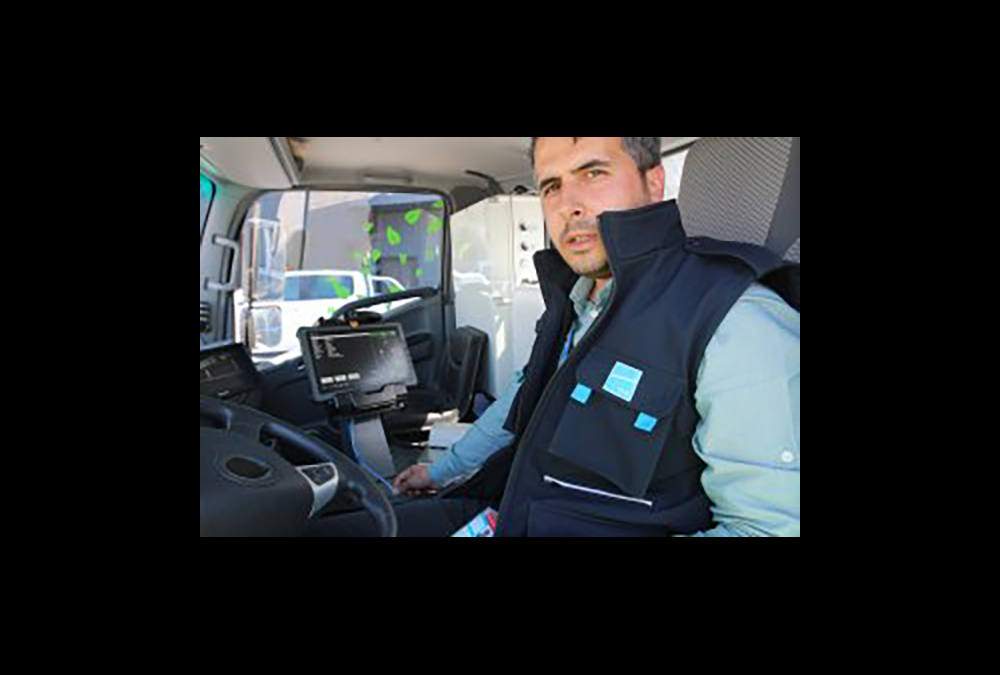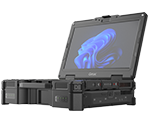Getac F110 Fully Rugged Tablets Keep Flights on Schedule at Istanbul Airport, the Largest Airport in the World

Istanbul Airport
Challenge
Opened for business on April 6th, 2019, Istanbul Airport (IST) is predicted to become the biggest airport in the world, hosting flights to 300 destinations and serving 200 million passengers annually. İGA Airport Fuel Services is responsible for refueling all the airplanes, which arrive at a rate of one every two minutes. They need to automate the refueling process to avoid delays. They also need to monitor the battery level of their fleet of electric hydrant dispensers.
Solution
On each hydrant dispenser, a Getac F110 is installed with a vehicle adapter and mounted on a Havis vehicle dock. The powerful Intel® Core™ processor combined with 4G connectivity allows the dispatcher to control the automated refueling process from the office. Operators can keep track of the electric vehicle’s battery level on the brilliant 11.6” sunlight readable display.
Benefits
Centralized control and automation of the refueling process through the F110 greatly reduces the possibility of human error leading to flight delays, which incur high costs for passengers, airlines, and airports alike. Real-time monitoring of the vehicles’ batteries keeps the fleet at peak readiness, which is essential at a busy airport that never sleeps.
“In our work, connectivity is very important. We need to connect the tablet with the vehicle, the meter, the printer, and the dispatcher. Ruggedness is also important because failure will cause delays. All in all, Getac tablets make our work around 60% more efficient.”
Seyfullah Yavuz, Delivery Facility Operation Chief, İGA Airport Fuel Services

Challenge
The biggest airport in the world opened for business on April 6th, 2019. Istanbul Airport (IST) is Turkey’s bid to replace neighboring regions such as Dubai as the hub airport of the world. Spread over 76.5 million square meters, Istanbul Airport will ultimately have the capacity to host flights to 300 destinations and serve 200 million passengers a year—which is more than half a million every day.
İGA is the operator of Istanbul Airport. İGA Airport Fuel Services Inc. (İGA Havalimanı Akaryakıt Hizmetleri A.Ş.) is the division responsible for refueling all the airplanes that pass through the airport. Ten gigantic storage tanks stand at a distance from the runways, each holding 30,000 metric cubes of precious aviation fuel. Currently, about 10,000 metric cubes are pumped into the 650 airliners passing through Istanbul Airport every day—that’s one plane being refueled every two minutes.
Unlike older airports that transport jet fuel around the tarmac in tanker trucks, Istanbul Airport has a sophisticated underground hydrant system that sends fuel directly to the boarding gates. İGA Airport Fuel Services employs a fleet of 70 electric vehicles known as “hydrant dispensers” to draw a hose from the pump to the airplanes’ underwing nozzles. Airline companies from around the world sign long-term contracts with İGA Airport Fuel Services to guarantee their planes are given enough fuel to begin the next leg of their journey.
The challenge comes from making sure the right planes are given the correct amount of fuel in a very narrow window of time. Airplanes arrive at and depart from the airport at a very high frequency. According to aviation law, refueling cannot start until all passengers have disembarked from the plane, after which there is only 45 to 60 minutes to clean the plane, run inspections, restock, and refuel. İGA Airport Fuel Services needs a way to get their hydrant dispensers in the right place at the right time to pump the right amount of fuel. Operators also need to monitor the battery level of their electric trucks. Any errors will cause flight delays—a nightmare for airlines and passengers alike. Failure is not an option for the kind of work done by İGA Airport Fuel Services.

Solution
For this project, Getac and its Turkish partner Noya Bilgisayar worked with İGA to install F110, the 11.6” fully rugged tablet that runs on the Windows 10 operating system, along with a vehicle adapter and a Havis vehicle dock in every hydrant dispenser in the entire fleet.
Dispatchers in the central office transmit information about incoming flights and the amount of fuel required to the vehicle-mounted Getac tablets via 4G. The operator confirms the order and drives to the appointed boarding gate. Once the underground fuel tank has been linked to the aircraft, automation software in the F110 monitors the refueling process to ensure there are no errors. Information is also transmitted via RS232 to an onboard printer that prints out the invoice that will be used to bill the airline. At the same time, the F110 runs another program to track the battery level of the electric vehicle to prevent equipment failure.
The Getac F110 is well-suited for the mission because its powerful Intel® Core™ i7 and i5 vPro™ processors allow it to run two programs—refueling automation software and electric vehicle monitoring software—simultaneously. The 11.6” display is big enough to show both programs in split screen. The user-friendly sunlight readable display allows operators to see all the information clearly even under the bright light of day. While the tablet is unlikely to get wet inside the driver’s cabin, it is fully rugged and completely protected against dust, shock, and vibration, and can operate in a wide temperature range from -21°C to 60°C. It is e-Mark certified for vehicle use and works well with the Havis vehicle dock, which connects to the invoice printer and fuel meter through RS232 cables. Getac F110’s powerful internet connectivity makes sure that vital data is transmitted from the home office to the hydrant dispensers in the field, so operators can complete their critical mission of refueling airliners on a tight schedule. In case technical support is needed, Getac’s Turkish partner Noya Bilgisayar, an Istanbul-based technology company with 25 years of history, is only a phone call away.

Benefits
Centralized and automated control of the refueling process from the office has several significant advantages. Jet fuel is expensive, so it is best to simplify the process for field operators to prevent miscalculations. In the past, orders were relayed by walkie-talkie, which often led to miscommunication. After installing Getac F110 in the fleet, dispatchers can remotely order the exact amount of fuel to be provided; operators just drive to the airplane and connect the hose to begin the automated refueling process. At the same time, dispatchers can track every aircraft and hydrant dispenser to maximize efficiency while minimizing downtime. This is crucial in the aviation industry, where flight delays cost a lot of money and may damage the airline’s reputation.
The F110’s powerful processing power makes it a multifunctional piece of field equipment. In addition to running refueling automation software, the power level of the electric vehicle is also monitored by a separate program. Vehicles with low batteries are quickly sent to be recharged, ensuring that the fleet is always ready to serve on the busy airfield.
İGA Airport Fuel Services has experimented with other tablets before, but now they are certain the Getac F110 is their preferred choice. Seyfullah Yavuz, Delivery Facility Operation Chief of İGA Airport Fuel Services, says, “In our work, connectivity is very important. We need to connect the tablet with the vehicle, the meter, the printer, and the dispatcher. The Getac F110 mounted on a vehicle dock has achieved this. It is very user-friendly with a bigger screen. Ruggedness is also important in our work because equipment failure will cause delays. Monitoring of the electric vehicle is a must, because the operator must be aware of the status of both the refueling process and the truck itself. All in all, Getac tablets make our work around 60% more efficient.”
About Istanbul Airport
Istanbul Airport (IST) is Turkey’s ambitious bid to become the hub airport of the globe. Opened for business on April 6th, 2019, it is predicted to become the world’s biggest airport, serving 200 million passengers travelling to 300 destinations every year. İGA Airport Fuel Services Inc. is the division that is responsible for refueling all the planes passing through the airport. It currently operates a fleet of 70 electric hydrant dispensers that pump 10,000 cubic meters of aviation fuel into 650 aircrafts every day—about one airplane is being refueled every two minutes.






















